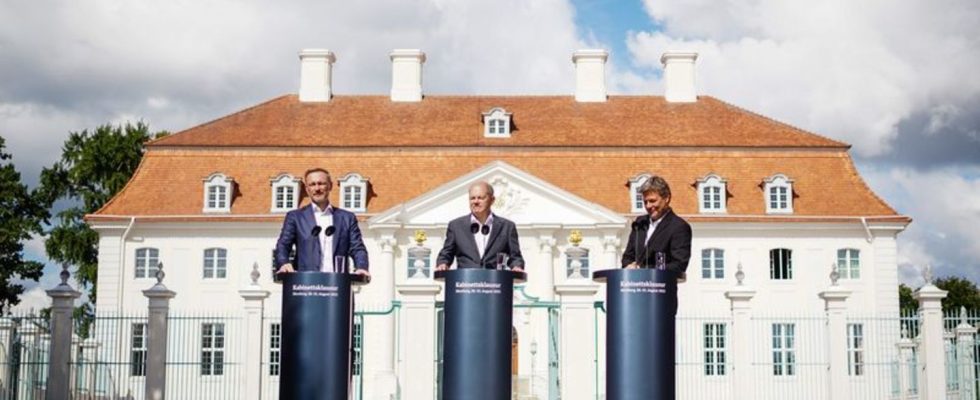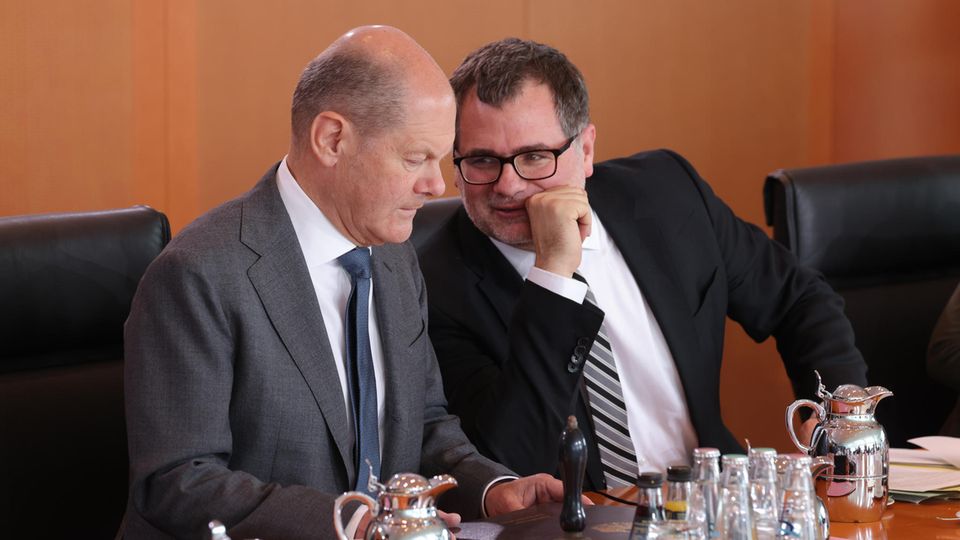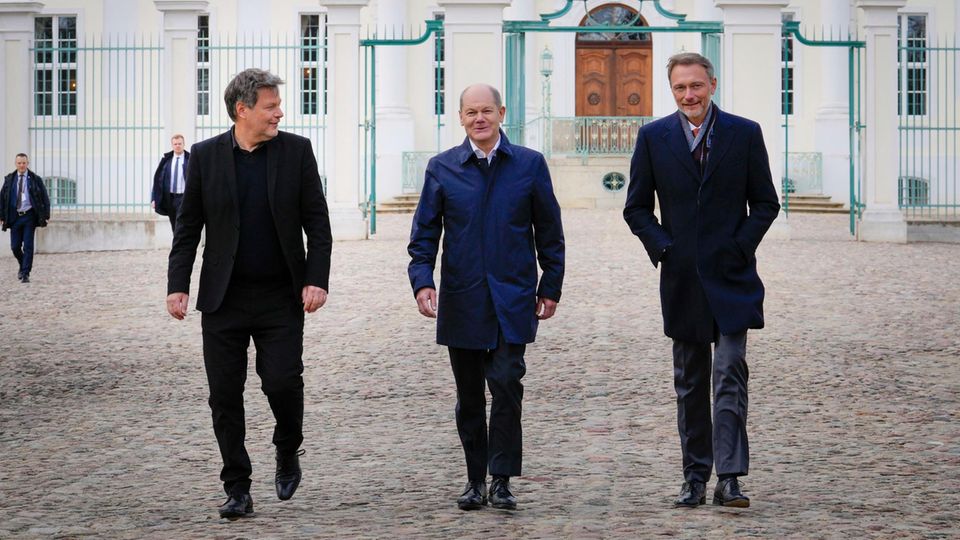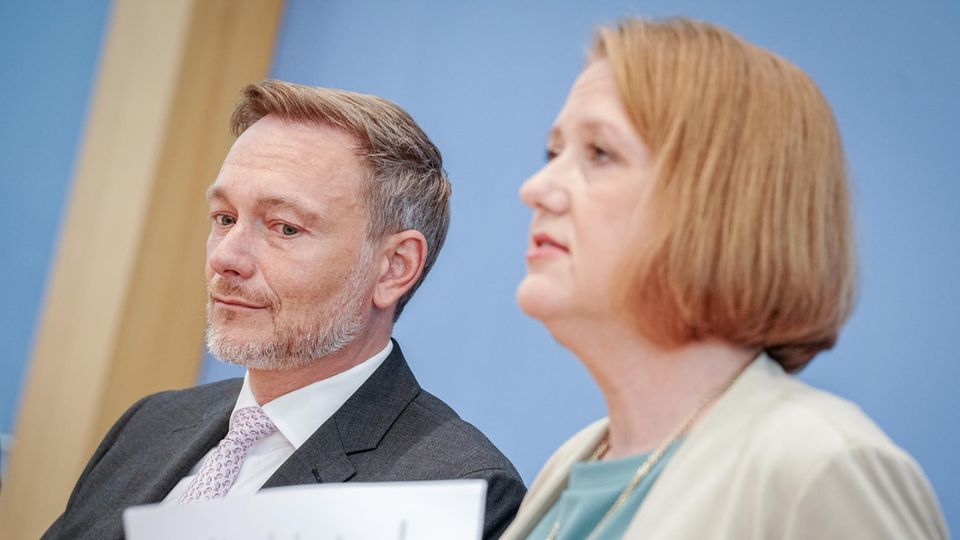federal government
The traffic light in rehab – what is at stake in the two days at Schloss Meseberg
Federal Chancellor Olaf Scholz (SPD), Economics Minister Robert Habeck (Greens) and Finance Minister Christian Lindner (FDP) will give a press conference in front of Meseberg Castle on August 31, 2022. photo
© Kay Nietfeld/dpa
Schloss Meseberg in the Brandenburg idyll as a spa for a battered coalition: not for the first time the traffic light government is trying to heal its wounds there. What’s different this time?
More quiet please! With this pious wish, Federal Chancellor Olaf Scholz (SPD) sent its 16 ministers on summer vacation in July after months of strife in the traffic light coalition. But at the first opportunity after the holiday all good intentions were thrown overboard. Because the financing of their basic child security had not yet been clarified, Family Minister Lisa Paus (Greens) blocked the law for more economic growth by Finance Minister Christian Lindner (FDP), causing an unprecedented scandal in the cabinet.
In the meantime, Paus and Lindner have come to an agreement. This clears the way for a new attempt to get into calmer waters. The right place for this is 50 kilometers from the gates of Berlin, in the small town of Meseberg. It is not for the first time that the baroque palace there, which has been the guest house of the federal government for 16 years, has acted as a sanctuary for an ailing traffic light government.
the initial situation
She couldn’t be more somber for the traffic light. In the polls, the three coalition parties together are now far from a majority. Even the strongest governing party, the SPD, is not only far behind the strongest opposition force, the CDU/CSU, but has even been pushed out of second place by the AfD.
According to a recent survey by the opinion research institute YouGov on behalf of the German Press Agency, 72 percent of Germans are dissatisfied with the work of the government in the first half of the election period. 68 percent do not trust her to solve the country’s pressing problems. And only 18 percent believe that Scholz will re-elect the traffic light coalition in the 2025 federal election.
The coalition partners are well aware that the quarrels of recent months have contributed to the poor values. Vice-Chancellor Robert Habeck (Greens) summed it up most recently: “We’re constantly screwing things up for ourselves. And of course that’s not a secret of success in the long run.”
The main theme
The retreat will focus on the precarious economy and recipes for improvement. Many economists are now expecting a decline in economic output in Germany for the year as a whole. There is talk of a danger of de-industrialization and the British “Economist” recently asked whether Germany was again the “sick man of Europe”. The German economy now expects a clear signal from Meseberg. “The strategic competitiveness of our country must now be the focus of all political action,” demands Employer President Rainer Dulger, for example.
The choices
This time, Meseberg shouldn’t just be the place where you can discuss everything in a relaxed atmosphere without pressure. It should also come out that is countable and presentable. A regular cabinet meeting will take place on Wednesday morning.
At the top of the agenda is Lindner’s Growth Opportunities Act, which was postponed two weeks ago and is now finally to be passed. It contains tax policy measures that are intended to relieve the economy by around 6.5 billion euros a year. The Minister of Finance thinks that the delay could even improve it somewhat. Justice Minister Marco Buschmann (FDP) also wants to present key points for a bureaucracy reduction law in Meseberg. Also an important topic to get the economy going again.
The Risks
With the agreement on the main features of basic child security, a conflict issue in the cabinet is off the table. But it may be that there will be trouble again in the parliamentary procedure. In addition, new potential for disputes is already lurking, for example the industrial electricity price.
Yesterday, just in time for the cabinet meeting, the SPD parliamentary group decided on a concept designed to relieve the burden on companies that are particularly hard hit by high energy costs. For them, the electricity price is to be capped at five cents per kilowatt hour for an initial period of five years. The FDP is against such a step. And even the chancellor remains skeptical. Scholz left the parliamentary group meeting in Wiesbaden yesterday before the decision on the industrial electricity price was made. It is unclear whether the topic will also be discussed in Meseberg.
The final point
Tomorrow at around 11:30 a.m. Chancellor Scholz, Vice-Chancellor Habeck and Finance Minister Lindner will, as always, appear together in front of the press to present the results of the exam. In addition to the cabinet decisions, it will certainly also be about dealing with each other in the coalition.
As is so often the case, everyone will probably promise to improve. As a result of the public dispute, uncertainty has seeped into society, SPD leader Lars Klingbeil complained in the “Rheinische Post” immediately before the exam. “That just has to end.” The test of the example will certainly not be long in coming.




